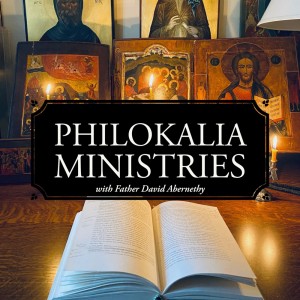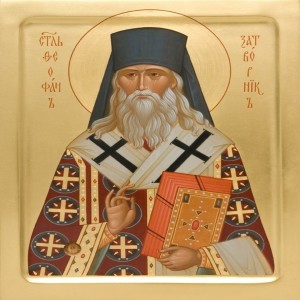Tonight we read the 19th letter of the Saint to the young Anastasia and the beginning of the 20th. Theophan finally comes to the point of describing for her the seed of inner confusion that we experience as human beings, our ancestral sin. We struggle with a disordered state, a disease, that has become deeply rooted within us and given rise to the worst of destructive forces - the passions. It is not natural! In other words, God has not created us in this fashion. Our forebearers took a path that led them away from God and, as it were, casts the gifts that He had bestowed upon them back in His face. They treated God not as benevolent and loving but as an obstacle to their happiness. The loss was immeasurable. Theophan wants Anastasia to have as her deepest conviction the fact that this disorderliness is not what God intended. She must fight against the view that there is no hope for a cure, that there is no hope for the dignity of the humanity to be restored. This must be our fight as well. The passions destroyed our consciousness of self and freedom. In the face of this we must make our one goal in life to abide in God in every way and to rejoice in Him alone.
---
Text of chat during the group:
00:47:43 Mary Schott: Is it not "natural" because the loss of preternatural gifts?
00:52:24 Eric Williams: If you want to read a saint who doesn't make *anything* sound easy, I highly recommend Ephraim the Syrian. :)
00:59:46 Fr. John (Ivan) Chirovsky: I think that "loss of preternatural gifts" is a western term or concept. Generally speaking Eastern Christian authors speak or write from the point of view that sin makes us sub-natural whereas holiness is natural to the human condition. One has to translate in the back of one's mind ... in the west the term "supernatural" is used where Easterners use "natural", and the western "natural" is "sub-natural" in the East.
01:08:45 Joe and Larissa Tristano: Fr John, agreed, amartyia, Greek for sin means to “miss the mark” - the passions are birth defects of the soul
01:08:53 Fr. John (Ivan) Chirovsky: ...and so, in the East, a "sub-natural" human being is thus "sub-human" or "inhumane", and the holy person is "natural" and "human".
01:09:10 Joe and Larissa Tristano: Yes! Christ being THE Human!
01:09:19 Fr. John (Ivan) Chirovsky: exactly!!!
01:15:09 carolnypaver: Holy gifts to holy people….
01:21:18 Mary McLeod: Thanks everyone!
More Episodes
The Ladder of Divine Ascent - Chapter XIV: On Gluttony, Part II
 2023-03-31
2023-03-31
 1.9k
1.9k
The Evergetinos - Hypothesis XXXIX, Part I
 2023-03-27
2023-03-27
 1.5k
1.5k
City a Desert Lecture Series, Lecture Three: Interiorized Monasticism Part III: Chastity and Obedience
 2023-03-23
2023-03-23
 2.6k
2.6k
The Ladder of Divine Ascent - Chapter XIV: On Gluttony, Part I
 2023-03-23
2023-03-23
 1.7k
1.7k
The Evergetinos, Hypothesis XXXVIII
 2023-03-21
2023-03-21
 1.4k
1.4k
City a Desert Lecture Series, Lecture Two: Interiorized Monasticism Part II: Fundamental Principles
 2023-03-16
2023-03-16
 2.8k
2.8k
The Ladder of Divine Ascent - Chapter XIII: On Despondency
 2023-03-16
2023-03-16
 2.0k
2.0k
The Evergetinos, Hypothesis XXXVII
 2023-03-13
2023-03-13
 1.5k
1.5k
Repentance
 2023-03-12
2023-03-12
 2.6k
2.6k
City a Desert Lecture Series, Lecture One: Introduction to Interiorized Monasticism
 2023-03-09
2023-03-09
 3.6k
3.6k
The Ladder of Divine Ascent - Chapter XII: On Lying
 2023-03-09
2023-03-09
 1.5k
1.5k
The Evergetinos - Hypothesis XXXV, Part II and Hypothesis XXXVI
 2023-03-07
2023-03-07
 1.3k
1.3k
To Love Fasting
 2023-03-03
2023-03-03
 3.4k
3.4k
The Ladder of Divine Ascent - Chapter XI: On Talkativeness and Silence
 2023-03-02
2023-03-02
 1.6k
1.6k
The Evergetinos - Hypothesis XXXV, Part I
 2023-02-28
2023-02-28
 1.4k
1.4k
The Ladder of Divine Ascent - Chapter X: On Slander or Calumny, Part II
 2023-02-23
2023-02-23
 1.4k
1.4k
The Evergetinos - Hypothesis XXXIV
 2023-02-21
2023-02-21
 1.2k
1.2k
The Ladder of Divine Ascent - Chapter IX: On Remembrance of Wrongs, Part II and Chapter X: On Slander or Calumny, Part I
 2023-02-15
2023-02-15
 1.4k
1.4k
The Evergetinos - Hypothesis XXXIII, Part IV
 2023-02-14
2023-02-14
 1.2k
1.2k
The Ladder of Divine Ascent - Chapter IX: On Remembrance of Wrongs, Part I
 2023-02-08
2023-02-08
 1.5k
1.5k
Create your
podcast in
minutes
- Full-featured podcast site
- Unlimited storage and bandwidth
- Comprehensive podcast stats
- Distribute to Apple Podcasts, Spotify, and more
- Make money with your podcast
It is Free
You may also like

Straight TV


The Tangent on Veritas Catholic Network


Life After Ministry


Astrology of the Week Ahead with Chani Nicholas


A Psychic’s Story

- Privacy Policy
- Cookie Policy
- Terms of Use
- Consent Preferences
- Copyright © 2015-2024 Podbean.com




 iOS
iOS Android
Android